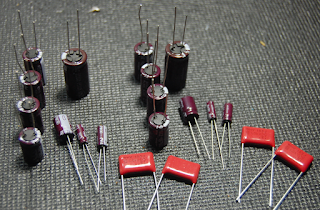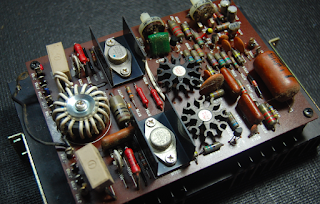Today Im showcasing the restoration of two Marantz 2270 receivers. One early model pre-4000 series and one latter series. The 2270 remains today one of the most popular receivers ever debut, touting a massive cult following, driving prices to ever increasing levels. The early 2270’s however had some significant technical shortcoming with one of the least reliable and buggy driver sections in any of the 22XX or even 23XX series receivers. All of these issues were addressed in the latter 2270 with a service update, 2275 receiver or after a proper restorations as highlighted below!
P800 Power Supply
The power supply develops and regulated the 13.5 and 35Vdc voltages for the RF/AF stages as well as the Protection for the output stage guarding against DC deviation and over-current indicators.
All of the electrolytic were replaced with a low impedance high temp (105C) Nichicon PW’s with an increase in operating voltages. The bypass .1 films were upgraded to a high voltage/high grade .1M ECW polypropylene Panasonic film capacitors. Initial half wave rectifier diodes were replaced with modern high voltage UF (Ultra-Fast) Fairchild axial diodes.
The original 696 transistor was replaced with a modern low noise TO-126 type Fairchild NPN device, remaining TO-92 devices were replaced with modern TO-92L Fairchild devices for better dissipation. A new precision Bourns 4.7K adjustment potentiometer and a new low noise Omron MY2 relay.
BEFORE
AFTER
+13.5Vdc & 35Vdc SUPPLIES CONFIRMATION
Hardware
The two filter capacitors are replaced with Panasonic’s with an increase from 9,000 to 12,000MFD for a tighter sub-sonic response on demanding applications.
Late Model
Early Model
As common with most 22XX series Marantz, the power switch will begin to arch and breakdown , these are replaced with 7-10A DPDT Push Switches.
P750 Drivers
The biggest difference/issue with the Marantz 2270 is the bias stage in the output section. Initial models report a bias cascade or extremely low bias points not sufficient for gain. This is prevalent in series 1001-3900. Series 3901+ had the original 2SC984 replaced with a TO-126 2SC496 device.
During the restoration process, and as highlighted in earlier published 2270’ restorations, the 984/496 devices are replaced with a higher hFE device and relocated along with the H761 diode to the driver heatsinks for a reliable influencer vs the output heatsinks.
Original Bias Transistors
New MJE TO-126 Bias transistors
Remaining differential pairs transistors were replaced with low noise modern TO-92 Fairchild devices thermally coupled and matched within 1% as demonstrated below on the hFE/I(A) curve mapping. 945 devices were also replaced with a modern TO-92L devices for better dissipation. The bias/offset pots were replaced with precision Bourns potentiometers.
Electrolytic capacitors were replaced with audio grade KT Nichicons with an increase in operating voltages including the tantalum. All existing mylar films/pp were replaced with modern MKP polypropylene films and the input 1MFD to a high grade MKP polypropylene film capacitor.
BEFORE
(EARLY)
(LATE)
AFTER
(EARLY)
(LATE)
BIAS CONFIRMATIONS
P700 RIAA EQ (PHONO)
The phono stage employed in the Marantz 2270 is identical to the 2230 and 2245 receivers. With a nominal gain of 40dB. On of the common issues in this stage is excessive noise due to the premature breakdown of the epoxy diode of failure prone 2SC458 type NPN transistors.
The 2SC458 and remaining 1000 (or 2SC1681 depending on serial numbers) were all replaced with modern, low noise Fairchild TO-92 devices. The VD type epoxy diode was replaced with a series of modern 4148 axial diodes. The tantalum capacitors were replaced with a KT audio grade Nichicon and the 100MFD increased to a 220MFD Nichcion PW with increases in operating voltages. Depending on the serial type the input/output coupling film values will be different, regardless both input/outputs were increased to high grade 1MFD polypropylene film capacitors vs .22/.47MFD inputs for a better curve response.
BEFORE
(EARLY)
(LATE)
AFTER
(EARLY)
(LATE)
P400 Tone Stage
Similar to the RIAA EQ stage, the tone stage in the 2270,2245 and 2230 are all similar in design and drive with very minor changes (see Marantz 1060).
All small signal transistors (2SA493/2SC1000) were replaced in this stage with modern, low noise TO-92 Fairchild devices for a low noise floor and cleaner output signal. The .22MFD input film capacitors were replaced with a high grade MKP polypropylene film capacitors. Remaining electrolytic capacitors were replaced with Nichicon Fine-Gold and KT audio grade with an increase in operating voltages. 1MFD capacitors were all replaced with high grade WIMA polypropylene film capacitors.
BEFORE
(EARLY)
(LATE)
AFTER
(EARLY)
(LATE)
LED’s
Original incandescent bulbs will stain the vellum paper from the radiant heat, replacing both meters and dial paper is important for an even display and color hue. It should be noted many early models do not have meter vellum paper..this should be installed to assists in proper diffusion across the meter displays.
New Vs Old Vellum paper!
Due to a high failure rate of incandescent bi-pins especially the stereo indicator new custom SMD Bi-Pins were installed. It should be noted uniquely to the 2270 that the stereo bulbs are a series of two bulbs. New 8V custom SMD type fuse LED lamps installed too.
AUDIO NOTIZEN



















































Amazing work as usual.
ReplyDeleteYeah! Can't wait!
ReplyDelete